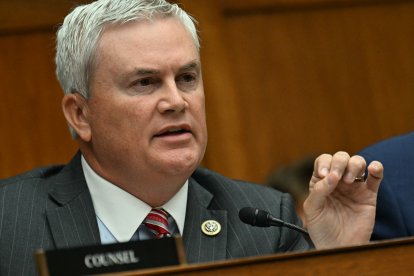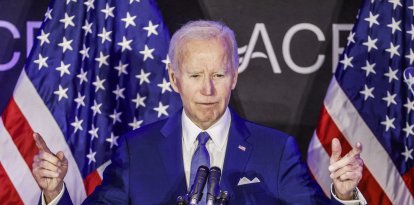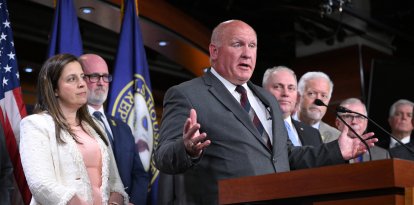House report charges that telework by civil servants costs taxpayers millions of dollars
The Oversight and Accountability Committee, chaired by Comer, criticizes the power granted by the Biden Administration to union leaders during his tenure and proposes measures to Trump to prioritize "the needs of the American people over the desires of federal bureaucrats."

James Comer, during a session in the House of Representatives-
James Comer, chairman of the House Oversight and Accountability Committee, charged that abuse of telework by federal officials is costing taxpayers millions of dollars. Republicans further criticized that the Biden Administration, which gave "too much power to union bosses," has laid the groundwork for public workers to continue this dynamic despite the arrival of Donald Trump, without taking into account the harm it causes to citizens and the cost of more than $7 billion that the rent and maintenance of these offices entails for the government.
According to the data found by the commission, of "the 2.28 million federal civilian employees, approximately 228,000 never have to go to the office, and almost all the rest, 1.1 million of employees technically eligible for teleworking, do so." The latter "were in the office an average of three days a week".
To this must be added that, a significant number of agencies also have employees entitled to telework who "together spend less than half of their working hours in the office." They also have workers who telework but "must report to the office from time to time," and "remote employees never have to report to work."
Offices at 9% of their capacity while the government pays 7 billion a year for them
This is causing that, as a Government Accountability Office (GAO) report already denounced, "17 of the 24 federal agencies were using on average 25% or less of the estimated capacity of their headquarters buildings." Worse, "some agency headquarters reported occupancy rates as low as 9%." That's while the rent and maintenance of these facilities costs the government some $7 billion annually."
As if that weren't enough, Comer charged that "federal agencies spent $3.3 billion on furniture in recent years, ostensibly to furnish office spaces left mostly vacant with maximum telework. Some agencies spent hundreds of thousands of dollars just to update empty conference rooms."
Alliance between Biden Administration officials and unionists to shield telework
In addition, the report exposes that officials in the Biden Administration have allied with union leaders in an effort to ensure that civil servants can maintain these conditions despite Trump's return to the White House. Thus, last April, the Office of Personnel Management issued a rule "aimed at deeper entrenching the federal workforce by restricting executive discretion over the classification of federal employee positions." The text does not include salient reforms regarding telework and "seeks to prevent the incoming Trump Administration from holding ineffective bureaucrats accountable."
With these agreements, "the outgoing Biden-Harris Administration signed long-term collective bargaining agreements with federal employee unions that limit management authority through unprecedented concessions, including guaranteed telework for federal bureaucrats."
Prioritizing "the needs of the American people over the desires of bureaucrats"
These moves are intended to tie down the incoming Administration, which has already announced it would bring public employees back to the bureaus, the document notes, "President Trump has promised to reform the federal workforce and return federal employees to their bureaus." The Biden-Harris Administration's lame-duck political gamesmanship will hinder and limit the incoming Trump Administration's ability to manage employees effectively and responsibly, and to increase accountability to the public."
In the statement accompanying the report, Comer noted that "President Trump was elected in a landslide victory to bring accountability to Washington. Our report not only identifies the many problems with massive federal telework, but also proposes solutions to get federal employees back in their offices, get rid of vacant and unused federal property, and prioritize the needs of the American people over the desires of federal bureaucrats. We look forward to working with President Trump and his administration to ensure that the federal bureaucracy is accountable to the American people."
House recommendations for telework reform
- Base telework and telecommuting policies on achieving mission outcomes, not employee preferences or union demands.
- Establish automated systems for tracking the use of telework and telecommuting, and create clear, measurable metrics to assess their costs and benefits.
- Impose more frequent and timely reporting requirements on telework at the agency level to better inform Executive Branch leaders, Congress, and the public.
- Recall to the White House and central management agencies to implement an enterprise-wide approach to telework and telecommuting that prioritizes the public interest. Not allow an interagency telecommuting bidding war that seeks to attract federal workers who move from one to another based on which will allow them to stay home longer.
- Align the federal property footprint with the government's office space needs. Get rid of unneeded properties and terminate unnecessary leases while optimizing the use of remaining space.
- Introduce and enact a new version of the SHOW UP Act, restoring telecommuting in agencies to levels no higher than pre-pandemic levels. Higher levels will only be allowed in agencies that make a compelling and measurable case for it.
- Consider enacting legislation that would disallow collective bargaining over telework by federal employees.
- Consider legislation to renegotiate, at the beginning of each new presidential term, all existing collective bargaining agreements with federal employees.
- Consider legislating to pay all federal employees who telecommute the same as in the rest of the United States, to encourage greater geographic dispersion of the federal workforce and reduce the cost to taxpayers.
RECOMMENDATION





















